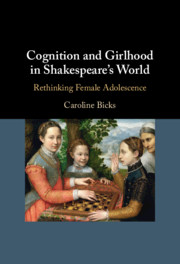Book contents
- Cognition and Girlhood in Shakespeare’s World
- Cognition and Girlhood in Shakespeare’s World
- Copyright page
- Dedication
- Contents
- Figures
- Acknowledgements
- Introduction
- Chapter 1 “A spectacle to men and angells”
- Chapter 2 “Imagination helps me”
- Chapter 3 “The progresse of an Art”
- Chapter 4 “If I should tell / My history”
- Chapter 5 “Put on the minde”
- Chapter 6 “From thirteene Yeares … resolved to serve God”
- Coda
- Notes
- Bibliography
- Index
Chapter 1 - “A spectacle to men and angells”
Juliet Capulet and the Case of Mary Glover
Published online by Cambridge University Press: 24 June 2021
- Cognition and Girlhood in Shakespeare’s World
- Cognition and Girlhood in Shakespeare’s World
- Copyright page
- Dedication
- Contents
- Figures
- Acknowledgements
- Introduction
- Chapter 1 “A spectacle to men and angells”
- Chapter 2 “Imagination helps me”
- Chapter 3 “The progresse of an Art”
- Chapter 4 “If I should tell / My history”
- Chapter 5 “Put on the minde”
- Chapter 6 “From thirteene Yeares … resolved to serve God”
- Coda
- Notes
- Bibliography
- Index
Summary
Chapter One features two girls on the verge of pubertal change: Shakespeare’s almost fourteen-year-old Juliet Capulet, and fourteen-year-old Mary Glover, a London girl who shot to fame after becoming allegedly bewitched by her neighbor. Both Mary and Juliet’s pubescent body-minds play in the gray area between pathology and performance, provoking epistemological dilemmas in their audiences. The chapter first argues that by marking Juliet so clearly in relation to the change of fourteen years, and tracking the fast-paced development of her brainwork, Shakespeare capitalized on his audiences’ fascination with this stage of dynamic female cognition. Juliet’s quick brainwork is largely illegible to her loved ones, but it also undergirds and powers the play’s narrative and moral trajectories. Next, the chapter considers how Glover’s menarche is a central point around which her chroniclers construct their conflicting arguments about her possession — a spectacular event that aggravated some of the most contentious religious and scientific debates of her day. All of the men who witnessed and wrote about Glover’s extraordinary physical and verbal acts grapple with the possibility that she could be willing her body-mind contortions, which were variously explained as a teenage girl’s performance, a scam, divine channeling, demonic possession, and authentic illness.
Keywords
- Type
- Chapter
- Information
- Cognition and Girlhood in Shakespeare's WorldRethinking Female Adolescence, pp. 33 - 64Publisher: Cambridge University PressPrint publication year: 2021

